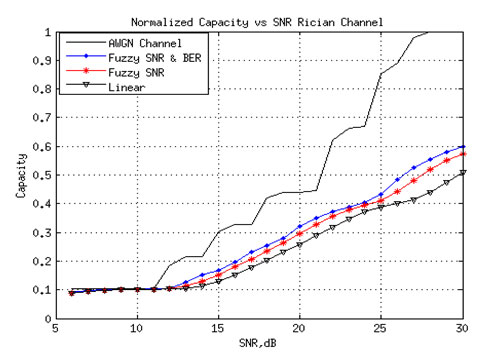Research of adaptive methods of increase of efficiency of broadband radioaccess systems
The new link adaptation method was created based on multicriteria channel state estimates with fuzzy logic mathematical apparatus. Matching link adaptation algorithms were created with usage of unusual improved fuzzy inference algorithm based on both link state energy estimations and multicriteria estimations (energetical, probabilistical, and statistical). The rules of membership function construction were determined. They are constructed by direct methods based on simulation results or laboratory measurements of stationary channel immunity. Creation rules of link state estimates membership function and assessment prediction membership function were determined with usage of estimates of the probability density function.
As a result of the research optimal methods of link state estimates (energetical, probabilistical, and statistical), optimal types of modulation, and noiseless coding for efficient link adaptation in wide broadband access systems were determined. A new method for probability estimates of link state was created based on accepted decisions in noiseless systems with FEC.
Separate block implementation principles (modulators, demodulators, FEC encoders, and decoders) were developed. Recommendations for adaptive methods usage to increase efficiency of wide broadband wireless access in both OFDM and single carrier modulation systems were developed.
Efficiency testing of developed algorithms obtained by simulation for both steady and unsteady links showed that application of those algorithms and link adaptation techniques would lead to significal spectral efficiency and communicational system immunity increase. This, in particular, will affect widebroadband access systems while working with non-stationary noise, caused by both flat fading and frequency-selective fading.

| Attachment | Size |
|---|---|
| 235.75 KB |




